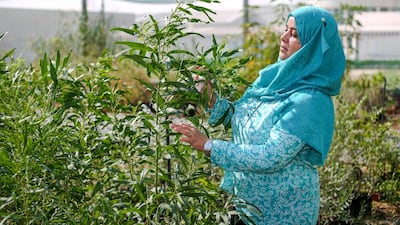DUBAI // A group of female Arab scientists have completed a pilot phase in an agricultural programme aimed at empowering them and furthering their careers.
Nine women from the Middle East and North Africa were chosen for Tamkeen, the Young Arab Women Scientists Leadership programme.
“One of the main things I learnt from this pilot project was self-control,” said Dr Henda Al Mahmoudi, a Tunisian biotechnologist at the centre.
“Sometimes you focus on research but you forget about leadership skills. This is very important and we think we have these skills but we don’t, until we really get to discover our potential and how to use it adequately.”
The programme is run by the International Centre for Biosaline Agriculture in Dubai and was held in Jeddah, Saudi Arabia. It aims to increase the representation of female farmers in the Middle East and improve the region’s food security.
“It’s vital to have such skills in agriculture science because we’re all leaders within small groups and we always work with people, so this helps in working faster and more efficiently,” Dr Al Mahmoudi said.
“We need awareness for women because they have the potential but they are not using it in the right way. There are great scientists in the region but they’re afraid to lead, maybe due to their culture or education.
“We need to be encouraged through such training and workshops. It’s one of many steps.”
The women were taught how to put together a team, influence their performance, conflict management and how to become more assertive.
“The design of the programme includes soft skills and science technical skills,” said Dr Ismahane Elouafi, director general of the centre.
“We set up a five-day programme and we realised as we did research that the leadership side is the biggest gap that those women feel is stopping them from moving forward in their career.”
The programme included women from the UAE, Oman, Jordan, Palestine, Lebanon, Egypt, Algeria, Tunisia and Morocco. Dr Elouafi said the pilot had proven successful.
“Most young ladies we received are very highly qualified on the scientific side, but had very little exposure and opportunities to get to the soft side of it,” she said.
“Assertiveness is a very important criteria that you have to understand how to use without coming across as being unprofessional.”
Women made up 45 per cent of the workforce in the Middle East’s agriculture sector in 2011, up from 34 per cent in 1995. And although more are joining agriculture sciences in regional universities, greater effort is needed.
“When it comes to the workforce, they disappear,” Dr Elouafi said. “We provide them with the know-how but not the conducive environment to grow and blossom. It’s the nature of our environment and they don’t have skills to go up the career ladder.”
The next step will be to formally launch the programme across regional countries and Tamkeen is looking for partners.
Azima Al Muselhi, 31, who works at the ministry of water resources in Oman, said she learnt a lot.
“Working with a team, leading, thinking positively and using emotional intelligence were key for me,” she said.
“It’s important because we don’t have many women in the field nor in leadership roles. We really need this in the Gulf and I really hope I end up becoming a leader in the field.”
Tamkeen will be officially launched in Astana, Kazakhstan, in October, after which women will be able to apply. The programme hopes to have 60 women involved next year.
Visit www.biosaline.org.
cmalek@thenational.ae

